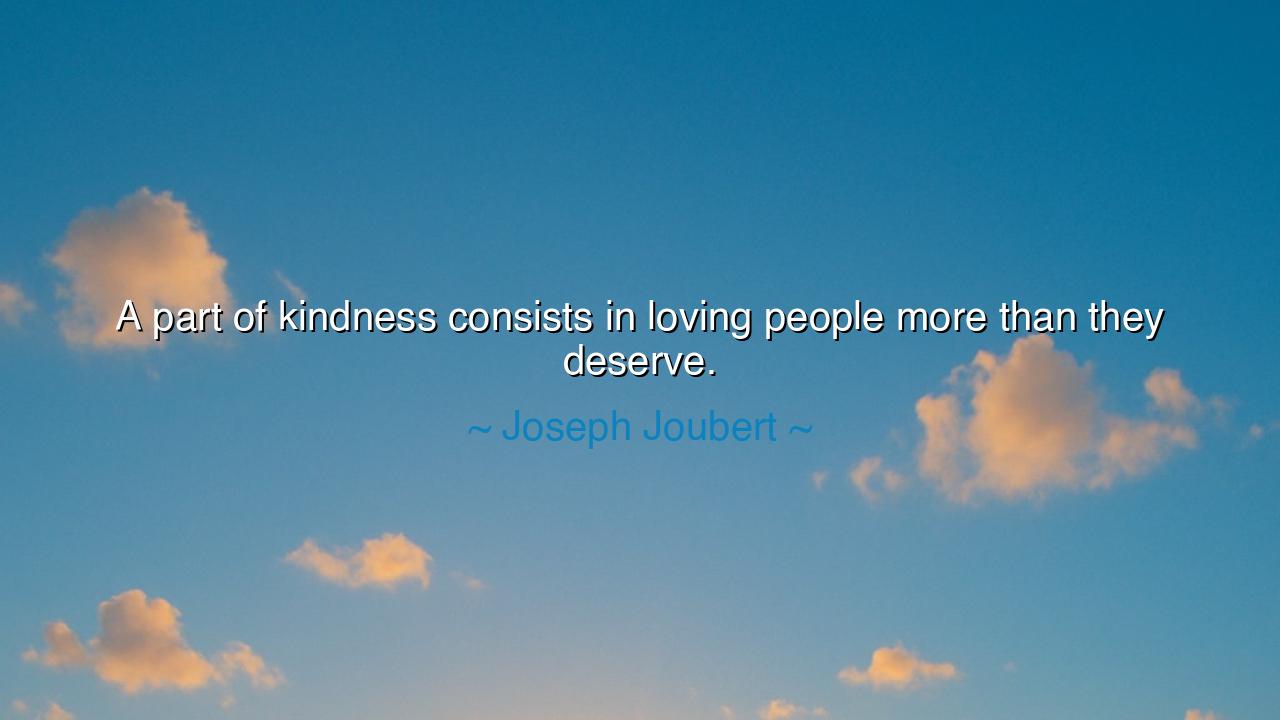
A part of kindness consists in loving people more than they






When Joseph Joubert wrote, “A part of kindness consists in loving people more than they deserve,” he touched upon one of the most profound and paradoxical truths of the human spirit. For what is kindness if not the courage to give beyond measure? To love people more than they deserve is to rise above judgment, to love not because of worthiness, but because of compassion. Joubert, a philosopher of the French Enlightenment, knew that the greatest acts of humanity are born not from fairness, but from grace. Fairness weighs the heart; kindness frees it.
In this single line, Joubert unveils the divine nature of mercy. Anyone can love the good, the kind, the deserving — but true greatness lies in extending love where it seems least deserved. For to love beyond desert is to break the chain of retribution and to participate in something higher than justice — it is to reflect the infinite generosity of life itself. The rain falls on both the pure and the impure; the sun shines upon the sinner and the saint alike. So too must the heart that seeks wisdom learn to love without condition, not because it is easy, but because it is transformative.
The ancients would have called this the love of the gods — agape, the selfless and boundless affection that expects no return. It is the love that forgives the fallen, that heals the bitter, that lifts the unworthy until they remember their own worth. To love more than one deserves is to see not the wound, but the soul beneath it. It is to recognize that within every heart — no matter how broken, cruel, or lost — there lies a spark of light that yearns to be remembered. Only kindness can uncover it.
Consider the story of Victor Hugo’s Bishop Myriel from Les Misérables, a tale born from the same spirit that animated Joubert’s philosophy. When the convict Jean Valjean stole the bishop’s silver and was caught, the bishop did not condemn him. Instead, he gave him even more — two candlesticks — saying, “With this silver, I have bought your soul for God.” That moment of undeserved mercy changed Valjean’s life forever. He became a man of compassion and virtue. The bishop’s kindness — his decision to love more than Valjean deserved — transformed sin into salvation, proving that love’s excess is never wasted.
In our own lives, we are often quick to measure affection, to withhold warmth from those who have failed us. We say, “They do not deserve my kindness.” But Joubert teaches that true kindness begins where reason ends. To love only the deserving is to love safely, but to love the undeserving is to love divinely. Such love does not ignore wrongdoing; it transcends it. It is not blindness — it is vision. It sees the human beneath the flaw, the soul beyond the sin, and says, “You are still worthy of love.”
This kind of love demands strength, not sentiment. It requires humility to forgive, patience to understand, and courage to stay gentle in a harsh world. To love people more than they deserve is not weakness — it is mastery. For only the strong can give when nothing is returned. Only the wise know that the love we give to others, especially when undeserved, is the love that refines our own soul. Every act of compassion softens the heart, and every undeserved kindness weakens the walls of cruelty that divide mankind.
Let this teaching, then, become a lamp for your life: be kinder than justice allows, and love deeper than fairness requires. When others fail, respond not with disdain but with mercy. When they fall short, help them rise. When they wound you, let forgiveness be your victory. For in giving more love than is due, you become a vessel of grace in a world that hungers for it. The measure of your kindness will not be found in those who earn it, but in those who need it most.
And so, remember this truth passed down through ages: a part of kindness consists in loving people more than they deserve. It is the part that redeems the human heart, the part that turns enemies into brothers, and pain into peace. When you love beyond reason, you touch eternity — for the heart that loves without condition becomes one with the love that created all things.






AAdministratorAdministrator
Welcome, honored guests. Please leave a comment, we will respond soon